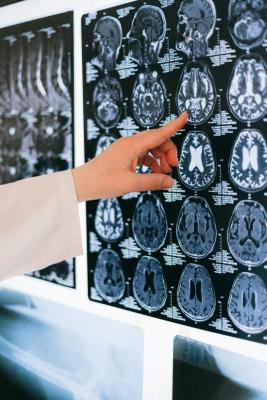Perlmutter Cancer Center Researcher Advances Therapies for Difficult-to-Treat Brain Tumors
A neuro-oncologist at the Brain and Spine Tumor Center at NYU Langone Health’s Perlmutter Cancer Center, Sylvia C. Kurz, MD, PhD, treats people who have brain tumors and cancer, as well as people who have immunotherapy-related side effects or pain resulting from cancer treatment–related nerve damage.
Dr. Kurz, assistant professor in the Departments of Medicine and Neurology and interim director of the Neuro-Oncology Program at Perlmutter Cancer Center, conducts translational and clinical research on brain tumors and is a co-investigator on various clinical trials, including several immunotherapy trials. In addition, her research focuses on developing new and more effective treatment options for people with progressive and therapy-resistant intracranial meningiomas. To this end, she is the co-chair of a clinical trial spearheaded and led by Perlmutter Cancer Center investigators that investigates a novel radionuclide therapy for advanced meningiomas.
She discusses how clinical trials are testing new treatments for people with hard-to-treat brain tumors such as meningioma and glioblastoma, a promising treatment for people with brain metastases, and more.
You are conducting several clinical trials for people with brain tumors. Are there any that you are particularly excited about?
I am most excited about a clinical trial that has been developed out of a multidisciplinary effort at Perlmutter Cancer Center that investigates the efficacy of a radionuclide therapy called Lutathera®. This drug is promising to treat people with progressive intracranial meningiomas. Meningiomas are often benign tumors, and most people don't think about them as cancers. However, a subset of tumors can be aggressive or progress to a more aggressive type of meningioma. In these cases, their treatment options are limited and not very effective. This study fills a vital gap as there are few clinical trials available for people with advanced meningiomas. This is one of the most popular clinical trials that we offer currently, and we attract patients from outside and inside NYU Langone to participate in this trial.
In this study, we are investigating a novel way of treating meningiomas. Instead of using a chemotherapy drug or a manufactured chemical agent, we are using a so-called radionuclide-linked antibody, 177Lutetium-DOTATATE, or Lutathera®, that targets a receptor is expressed in approximately 95 percent of all meningiomas. Because the radioactive substance is attached to the antibody, it can be delivered very locally and only to the cells that bind to that antibody.
We launched the study last year, and we've now enrolled 12 patients. We’ve had the first group of patients complete the protocol of four doses of the treatment and now we're entering the surveillance stage. Half of the patients have finished all the treatments, the others are still going through the treatments. What we have seen is that there are certainly patients whose tumor progression is halted on the study.
Another important and popular clinical trial is our study of a drug called ONC201 to treat a special type of high-grade glioma that is characterized by a histone K27M mutation. This study has attracted patients from all over the world to come to Perlmutter Cancer Center.
You also treat people with treatment-related brain and nerve damage. Can you tell us about your success with these patients?
Anecdotally, I can share my excitement in treating a patient with advanced HER2-positive breast cancer whom I share with Sylvia Adams, MD, professor of medicine and director of the Breast Cancer Center at Perlmutter Cancer Center.





















